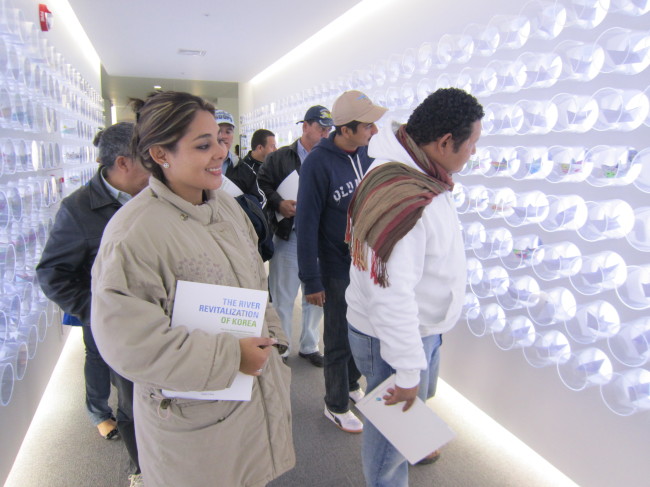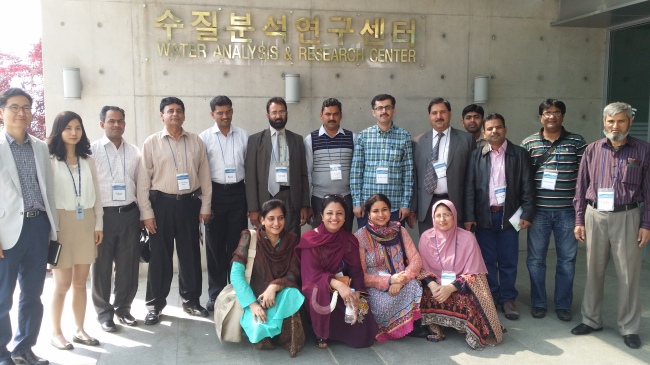K-water spurs global expansion with smart solutions
By Korea HeraldPublished : April 13, 2015 - 20:13
The state-run Korea Water Resources Corp., better known as K-water, is seeking growth opportunities internationally with its smart water management technology.
Taking the 7th World Water Forum as a platform for global marketing, the state-run water resources management corporation is stepping up promotions of its advanced water technologies to the world, while seeking to gain a foothold to enter overseas water markets.
The international water event is being held in Daegu and North Gyeongsang Province on April 12-17.
Taking the 7th World Water Forum as a platform for global marketing, the state-run water resources management corporation is stepping up promotions of its advanced water technologies to the world, while seeking to gain a foothold to enter overseas water markets.
The international water event is being held in Daegu and North Gyeongsang Province on April 12-17.

“K-water is an industry leader in that it provides a total solution for the whole process of water management, ranging from water sources to end users, based on information and communication technology,” K-water CEO Choi Gye-woon said.
He expects the international water forum will open up new business opportunities to spread its next-generation water management technology, which underlines the convergence of ICT in water management processes, and aims to maximize water resource efficiency.
Targeting international opinion leaders visiting the forum, the nation’s sole water resource developer presented its “smart water management initiative,” or SWMI, which is designed to increase the stability of fresh water supply by adjusting the amount of water supplied to actual consumption rates. This is done while minimizing energy consumption through smart grid integration and water spillage through leak detection.
“The company expected that SWMI will be recognized by K-water’s signature brand and to become a major driving force for its overseas expansion,” a K-water official said.
K-water uses smart sensor networks to monitor water flow and a support system for water utilities so that supply and demand patterns can be matched in real-time.
As an additional benefit, water leakage can be predicted with statistical methods so that water network damage can be mended even before it occurs.

The move comes amid a growing global water market, which is forecast to increase by an average 4.2 percent per year to $689 billion in 2018 from $556 billion in 2013, according to U.K.-based Global Water Intelligence, a water industry research firm. K-water expects to secure $11.5 billion worth of accumulated overseas orders by 2024.
The CEO stressed that K-water will diversify its business portfolio through strategic partnerships with global water companies this year.
“The company will also actively develop new overseas business projects, while strengthening the profitability of existing businesses by solidifying relations with international organizations and global companies,” he said.
As part of its globalization efforts, K-water signed a contract Monday with France-based Suez environment, a global water management firm, to jointly seek domestic and overseas water projects and carry out research on smart water management technology.
“Development of new water projects in Korean and foreign markets is expected to be advanced with the partnership with Suez,” K-water CEO Choi said.
K-water has completed a total of 55 water-related projects in 24 countries since it entered the overseas water market in 1994.
Currently, the company is working on 20 projects in 13 countries, including a 477 billion won hydro power project in Patrind, Pakistan.
The Algerian government is also working with K-water to adopt integrated water management technologies to tackle the problems it faces with repeated flooding and droughts.
The reason behind the rising water industry and market expansion is water scarcity, which is caused by limited water resources on the planet. Climate change, continued urbanization and industrialization, and a growing population intensifies water demand, industry experts said.
At the current consumption rate, two-thirds of the world’s population may face water shortages by 2025, they added. Water consumption in countries like China and India, which is experiencing expanding populations and a subsequent focus on industrialization, is expected to surge in the coming years. By 2025, about 60 percent of the total drinking water to be consumed will be in Asian countries.
Faced with such challenges, investment in building sustainable water resources management, including sewage purification and seawater desalination systems, is increasing.
Amid such macro trends in the water sector, the Chinese town of Yanji, which suffers from persistent drought and low water flow rates, signed a contract with K-water in 2014 to adopt a smart water management system to tackle water supply issues.
“The paradigm of the water industry is shifting from water and sewage to an integrated water management business based on ICT technologies,” a K-water official said.
“The market is getting bigger as it is considered a higher value-added business,” he said.
Water resource infrastructure construction is one of the core fields of official development assistance as it is an essential element for the economic development of a developing country.
K-water has completed 41 water-related ODA projects in 19 countries in collaboration with the Korea International Cooperation Agency. It is currently carrying out 11 projects.
K-water’s businesses can be divided into three sectors ― water resource infrastructure, water supply and hydropower development projects.
“The type of project can be decided based on each country’s circumstances and needs. For example, river maintenance and dam construction can help the nation prevent flooding and supply water in a stable manner,” the official said.
For Cambodia, K-water established a comprehensive plan for the country’s water resource development and provided analysis and predictions for water demand. The project took more than 26 months from 2006 to 2008.
K-Water has also undertaken a collaborative project with the Indonesian government to improve the water quality of the Citarum river basin, one of world’s most polluted places, in Indonesia.
By Park Han-na (hnpark@heraldcorp.com)
-
Articles by Korea Herald



![[AtoZ into Korean mind] Humor in Korea: Navigating the line between what's funny and not](http://res.heraldm.com/phpwas/restmb_idxmake.php?idx=644&simg=/content/image/2024/04/22/20240422050642_0.jpg&u=)

![[Exclusive] Korean military set to ban iPhones over 'security' concerns](http://res.heraldm.com/phpwas/restmb_idxmake.php?idx=644&simg=/content/image/2024/04/23/20240423050599_0.jpg&u=20240423183955)

![[Herald Interview] Why Toss invited hackers to penetrate its system](http://res.heraldm.com/phpwas/restmb_idxmake.php?idx=644&simg=/content/image/2024/04/22/20240422050569_0.jpg&u=20240422150649)
![[Graphic News] 77% of young Koreans still financially dependent](http://res.heraldm.com/phpwas/restmb_idxmake.php?idx=644&simg=/content/image/2024/04/22/20240422050762_0.gif&u=)







![[Exclusive] Korean military to ban iPhones over security issues](http://res.heraldm.com/phpwas/restmb_idxmake.php?idx=652&simg=/content/image/2024/04/23/20240423050599_0.jpg&u=20240423183955)



![[Today’s K-pop] Ateez confirms US tour details](http://res.heraldm.com/phpwas/restmb_idxmake.php?idx=642&simg=/content/image/2024/04/23/20240423050700_0.jpg&u=)